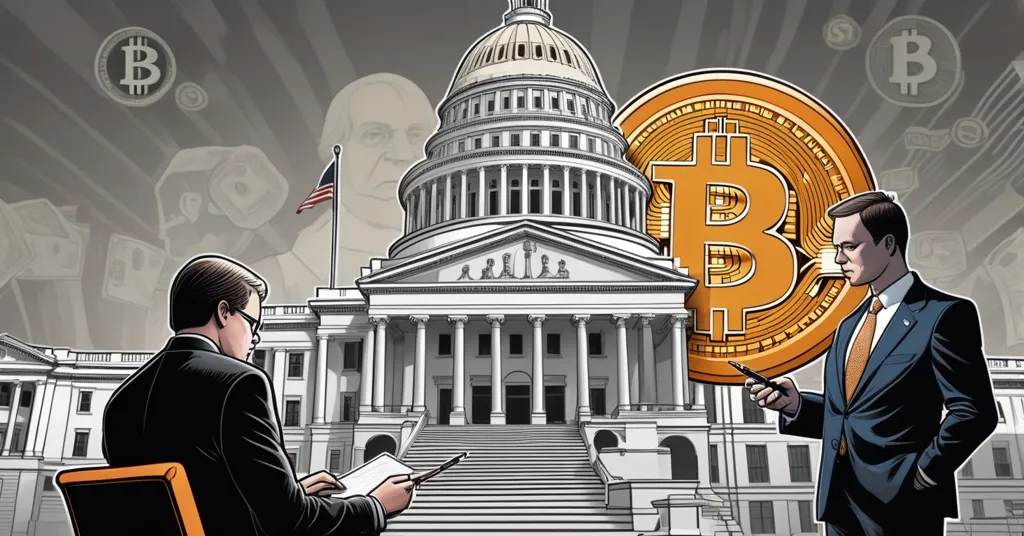Arizona’s Bold Crypto Investment Bills Await Governor’s Decision

Arizona’s Crypto Ambitions Hang in the Balance
Arizona is poised to revolutionize its financial strategy by potentially becoming the first U.S. state to invest public funds in cryptocurrencies, awaiting the decision of Governor Katie Hobbs.
- AZ Senate Bills 1025 & 1373 passed, awaiting Governor Hobbs’ signature.
- Up to 10% of public funds could be invested in Bitcoin.
- Digital Asset Strategic Reserve Fund to include various cryptocurrencies, stablecoins, and NFTs.
The Arizona legislature recently greenlit Senate Bill 1025, the Arizona Strategic Bitcoin Reserve Act, with a close vote of 31-25-4 in the House and 17-11-2 in the Senate. This bill would allow the state to allocate up to 10% of its public funds to Bitcoin, a move that could see Arizona become a trailblazer in state-level cryptocurrency investment. But let’s be real—throwing taxpayer money into Bitcoin’s rollercoaster ride is a gamble. It could either catapult the state into the future of finance or leave it nursing a hefty hangover from the volatility.
On the flip side, Senate Bill 1373 passed the House with a 37-19-4 vote, and previously the Senate on February 27. This legislation proposes the creation of a Digital Asset Strategic Reserve Fund designed to hold a diverse portfolio of digital assets, including cryptocurrencies, stablecoins, and non-fungible tokens (NFTs). For those not in the know, NFTs are unique digital items that can represent art, music, or other collectibles, while stablecoins are cryptocurrencies pegged to stable assets like the US dollar to minimize price swings. This fund would also serve as a repository for assets seized in criminal cases, potentially providing a steady stream of digital assets beyond fiscal year limits. It’s like Arizona is aiming to be the Wild West of Crypto, but with a safety net—or is it just juggling digital hot potatoes?
Governor Hobbs holds the key to this crypto kingdom. With a record-breaking 143 vetoes in the 2023 legislative session, she’s shown a willingness to block bills that don’t align with her vision, especially those lacking bipartisan support. Her recent threats to veto legislation stem from a demand for a funding solution to protect healthcare for Arizonans with disabilities. It’s a commendable stance, but it leaves these crypto bills hanging in limbo. Will Hobbs see the potential in these financial strategies, or will she slam the door on Arizona’s chance to lead the digital asset frontier?
Should these bills become law, Arizona would be the first U.S. state to officially invest public funds in cryptocurrencies, setting a precedent that could ripple across the nation. This isn’t just about betting on Bitcoin; it’s about recognizing the shifting tides of finance and embracing the future of money. Yet, it’s also a high-stakes game—Bitcoin’s wild price swings could either make or break the state’s financial health. And don’t get us started on the political minefield of NFTs and stablecoins, which some critics argue are little more than speculative digital assets.
Looking at the broader landscape, other states are dipping their toes into the crypto pool. Delaware has embraced blockchain technology for statutory trusts and LLCs, while Florida has defined virtual currency in its statutes. Arizona’s move could inspire other states to follow suit, potentially leading to a more decentralized and innovative financial ecosystem. But as with any revolution, the path is fraught with risks and uncertainties. Is Arizona ready to blaze the trail, or will it be a cautionary tale of financial folly?
As we await Governor Hobbs’ decision, the crypto community watches with bated breath. Will Arizona’s bold move into crypto be a step towards financial innovation or a risky gamble with public funds? One thing is certain—Arizona is at a crossroads, and the road it chooses could shape the future of finance in America.
Key Questions and Takeaways
- What are the main objectives of Senate Bill 1025 and Senate Bill 1373?
Senate Bill 1025 aims to allow Arizona to invest up to 10% of public funds in Bitcoin, potentially positioning the state to participate in a future federal Bitcoin reserve. Senate Bill 1373 seeks to establish a Digital Asset Strategic Reserve Fund to hold various digital assets, including those seized from criminal cases, ensuring continuous funding beyond normal fiscal year boundaries.
- What is the current status of these bills in Arizona?
Both bills have passed the Arizona Senate and House and are awaiting the approval of Governor Katie Hobbs.
- What conditions has Governor Hobbs set for approving bills?
Governor Hobbs has stated she will veto bills until the Republican-controlled legislature approves a bipartisan funding solution that protects healthcare for Arizonans with disabilities.
- What could be the impact if Governor Hobbs signs these bills into law?
If signed into law, Arizona would become the first U.S. state to officially invest public funds in cryptocurrencies, potentially setting a precedent for other states and influencing federal policies regarding digital assets.
- What types of digital assets are included in the proposed Digital Asset Strategic Reserve Fund?
The fund would include various cryptocurrencies, stablecoins, NFTs, and digital assets seized from criminal cases.



